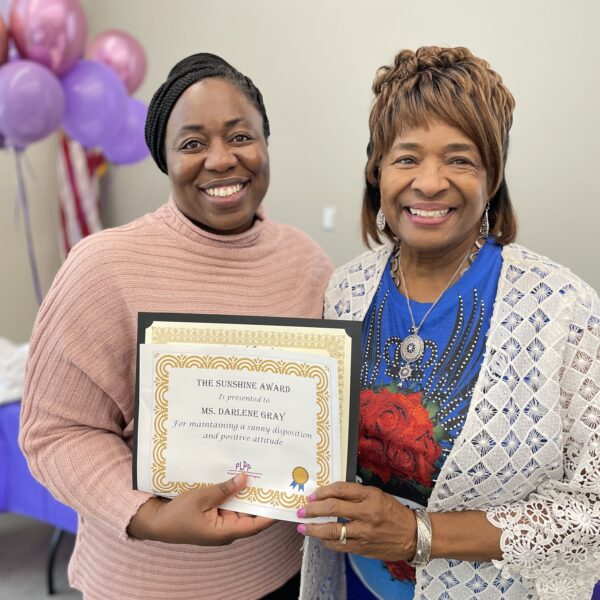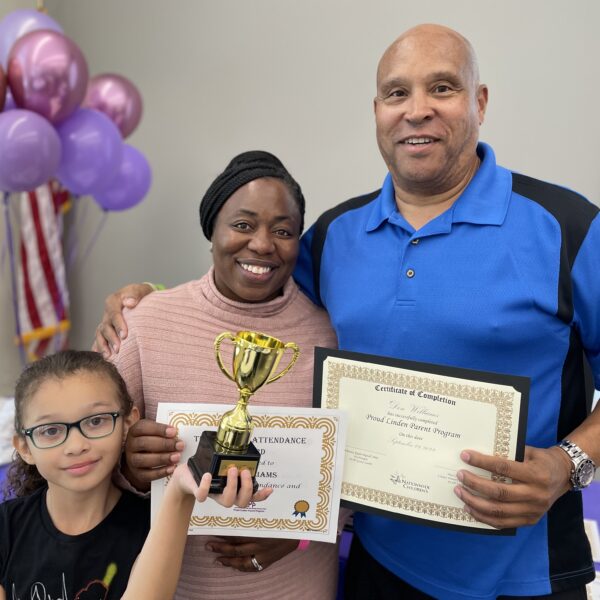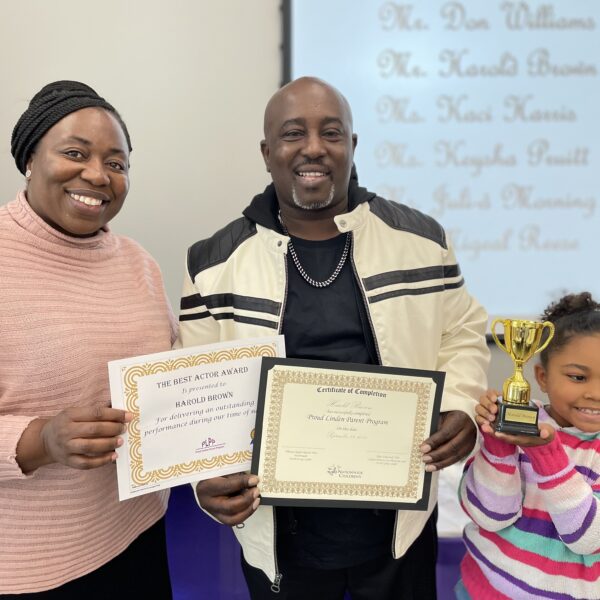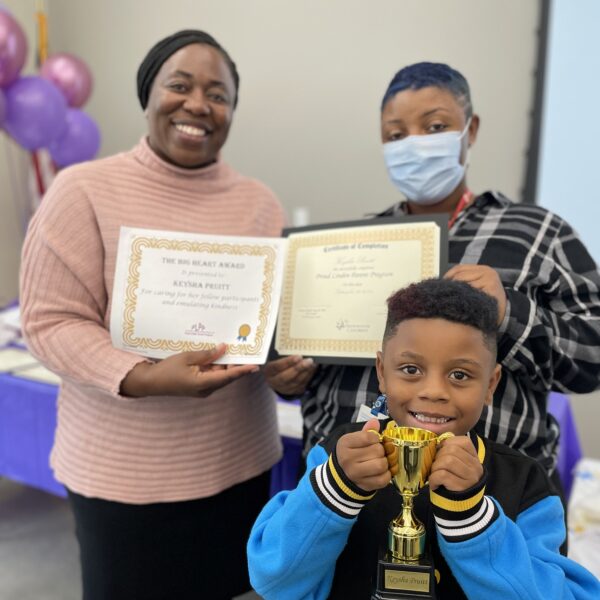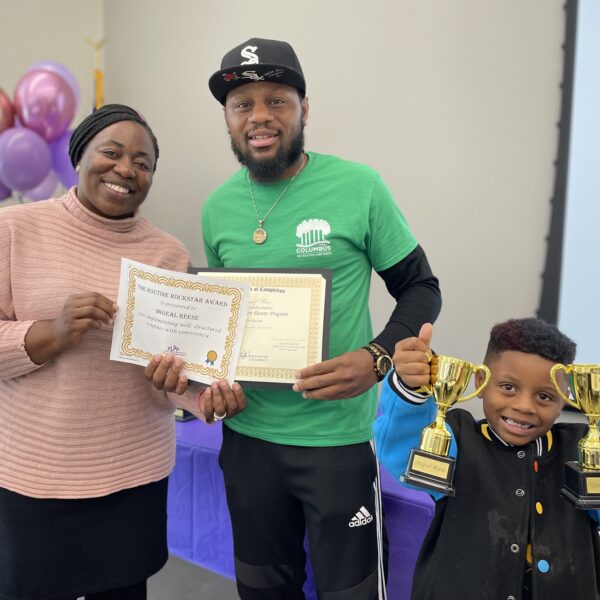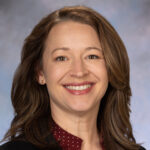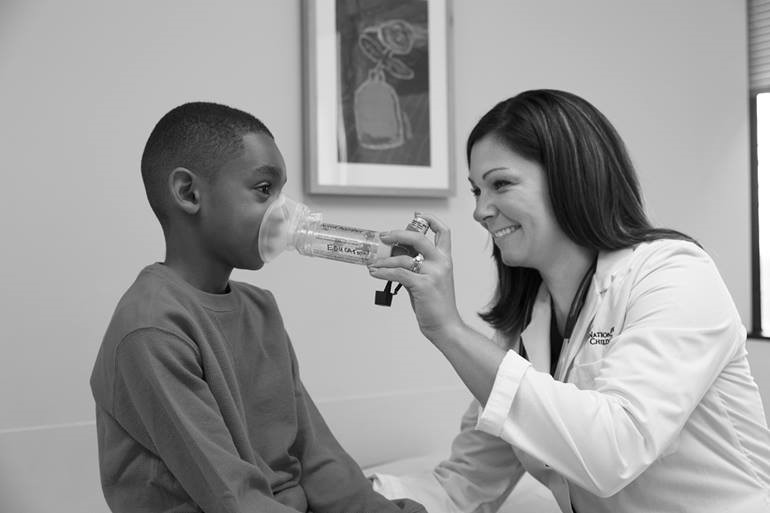Whole Child, Whole Family Care
Whole Child, Whole Family Care https://pediatricsnationwide.org/wp-content/themes/corpus/images/empty/thumbnail.jpg 150 150 Abbie Miller and Jeb Phillips Abbie Miller and Jeb Phillips https://pediatricsnationwide.org/wp-content/uploads/2023/05/051023BT016-Abbie-Crop.jpg- October 13, 2023
- Abbie Miller and Jeb Phillips
Meeting the needs of children and caregivers with evidence-based programming and intentional support for access.
Parenting a young child can be tough in the best circumstances. But when you overlay poverty, inequity, and concerns about employment and education on top of it, parenting a young child can feel overwhelming.
Whitney Raglin Bignall, PhD, has dedicated her career to meeting children and families where they are. She’s a pediatric psychologist at the Nationwide Children’s Hospital’s Linden Primary Care Center. And this spring she added the role of associate clinical director of The On Our Sleeves Movement For Children’s Mental Health.
To date, she’s helped develop and implement two programs that support parents by challenging systems and barriers to care.
Proof of Concept: Behavioral Parent Training in Primary Care
In behavioral parent training (BPT), parents attend sessions with a therapist to learn strategies to help their child modify behaviors. In between sessions, parents practice what they learn, while continuing to receive support from the therapist.
According to the Centers for Disease Control (CDC), parent training is recommended for families with children under 12 years with ADHD. Evidence shows that this approach yields lasting benefits such as improved family relationships and increased success at school.
While she was on practicum at the Center for ADHD at Cincinnati Children’s Hospital Medical Center, Dr. Raglin Bignall noticed that many of the urban, Black families who would benefit from a BPT course offered at the center were not attending. She began thinking about a project that would work to improve access to the programming.
“The population of people who were coming to the center for support wasn’t mirroring the population of the community,” Dr. Raglin Bignall explains. “When you see that, there are opportunities to improve health equity and look at the systems that may be creating barriers to access.”
When she moved on to a fellowship offering behavioral health care in the primary care setting, the opportunity to implement her ideas in a project opened up. Her team’s project was recently published in Families, Systems & Health.
“BPT is the first-line treatment for children in preschool with disruptive behavior,” says Dr. Raglin Bignall. “We have the science, but systems kept the door closed for people who needed to get in. Our project showed that we can adapt programs and systems to make accessible an evidence-based program for an urban, predominantly Black population.”
Dr. Raglin Bignall’s team use materials from the Center for ADHD, but they diversified the imagery used, improved the readability for health literacy, and made examples more concrete and less abstract.
Other adjustments that Dr. Raglin Bignall says helped the program be successful included:
- Adjusting the format to be modular so that attendance could be more flexible
- Changing the referral process to build relationships with families through integrated behavioral health care in the primary care setting
- Involving the school much sooner to identify and address immediate needs
BPT is the first-line treatment for children in preschool with disruptive behavior. We have the science, but systems kept the door closed for people who needed to get in.”
Whitney Raglin Bignall, PhD, pediatric psychologist at Nationwide Children’s Linden Primary Care Center

Building Community With the Proud Linden Parent Program
Now at Nationwide Children’s, Dr. Raglin Bignall has worked with the hospital, primary care network and community partners to begin a neighborhood-specific parenting initiative called the Proud Linden Parent Program. It takes evidence-based, positive parenting strategies and contextualizes them with the concerns and challenges that families in the diverse Columbus neighborhood of Linden may face.
“Some families are struggling with housing, or they really need resources that traditional positive parenting programs don’t focus on,” Dr. Raglin Bignall says. “Many of the principles are the same as you find in positive parenting programs. We talk about family routines, or discipline, or praising children. But we also talk about the real-world situations that these families face in Linden, and how to address them.”
The curriculum is based on the Chicago Parent Program, which was validated in an urban, racially diverse, low-income population. Many of the parents in the Linden program are identified through the Linden Primary Care Center, where 75% of patients are Black and 12% are Latino.
Dr. Raglin Bignall guides the program, “but I am not up there telling people how to parent,” she says. The 11-session program (with a separate graduation) is heavily discussion-based and respectful of the caregivers’ opinions and values. It often begins with questions like “What goals do you have for yourself?” or “Where do you see your child in five years?” The parents also have access to the Linden Primary Care Center’s community health worker, an expert in connecting people to the resources they need. Parents of children ages 1-8 are eligible.
Dr. Raglin Bignall and her team recognize that it’s not easy to ask busy, stressed parents to commit to three months of classes, so they try to remove every barrier possible. They serve dinner. They have childcare — so far, led by Akua Amponsah, MD, medical lead at the Linden Primary Care Center and associate chief for population health in the Division of Primary Care Pediatrics (known affectionately in the community as “Dr. A”).
“The kids love playing together. They love seeing Dr. A. The parents get to have a pediatrician as their childcare provider,” says Dr. Raglin Bignall. “Parents and families really end up wanting to do this and are sad once it’s over.”
Akua Amponsah, MD, medical lead at the Linden Primary Care Center and associate chief for population health in the Division of Primary Care Pediatrics with Proud Linden Parent Program participants.
But one of the great benefits of the Proud Linden Parent Program is that it helps build a community of parents, she says. These parents now know other parents that they can support, or who can support them. In fact, a program graduate is now the community health worker for the Linden Primary Care Center.
Given the program’s popularity and success, Dr. Raglin Bignall is looking at ways to expand.
“Getting medical and psychology trainees as well as other clinicians involved in the program will not only give them valuable experience in working with the community, but it will give us the opportunity to expand across the neighborhood,” Dr. Raglin Bignall says. “Ultimately, I envision a community of Proud Linden Parents, trained in positive parenting strategies and empowered to make a difference for children and families in their neighborhood.”
“We’re really just getting started — I have high hopes and big dreams for this program and the benefits it can bring to families,” she says.
This story also appeared in the Pediatrics Nationwide Fall/Winter 2023 print issue. Download the PDF of the issue.
References:
Raglin Bignall WJ, Herbst RB, McClure JM, Pero MB, Loren REA, Burkhardt MC. Adapting a preschool disruptive behavior group for the underserved in pediatric primary care practice. Families, Systems & Health. 2023;41(1):101-111.
Image credit: Nationwide Children’s
About the author
Abbie (Roth) Miller, MWC, is a passionate communicator of science. As the manager, medical and science content, at Nationwide Children’s Hospital, she shares stories about innovative research and discovery with audiences ranging from parents to preeminent researchers and leaders. Before coming to Nationwide Children’s, Abbie used her communication skills to engage audiences with a wide variety of science topics. She is a Medical Writer Certified®, credentialed by the American Medical Writers Association.
Jeb is the Managing Editor, Executive Communications, in the Department of Marketing and Public Relations at Nationwide Children's Hospital. He contributes feature stories and research news to PediatricsOnline, the hospital’s electronic newsletter for physicians and other health care providers, and to Pediatrics Nationwide. He has served as a communications specialist at the Center for Injury Research and Policy at The Research Institute and came to Nationwide Children’s after 14-year career as daily newspaper reporter, most recently at The Columbus Dispatch.
-
Jeb Phillipshttps://pediatricsnationwide.org/author/jeb-phillips/April 28, 2021
-
Jeb Phillipshttps://pediatricsnationwide.org/author/jeb-phillips/October 13, 2023
- Posted In:
- Clinical Updates
- Features
- Research



